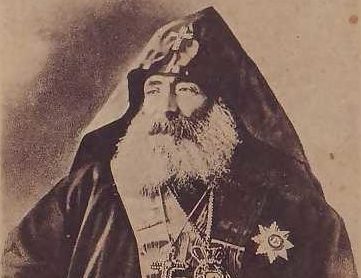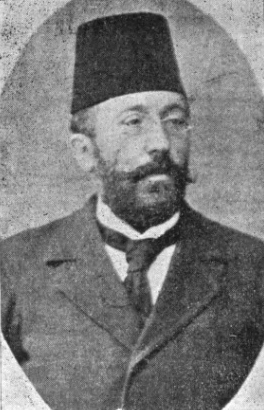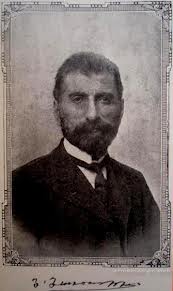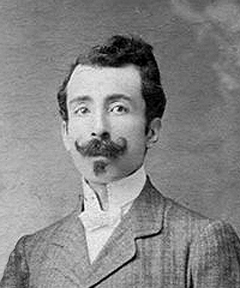Western Armenian literature is usually perceived as what was written in Constantinople. But much of that literature does not portray the life of Armenians living in the eastern provinces of the Ottoman Empire – the Armenian homeland. As such, that literature rarely reflects the issues Armenians were facing leading up to the Genocide. There were however numerous authors who did write about those issues, though they are usually understudied or neglected.
Below is a brief survey of five authors – Mkrtich Khrimian, Garegin Srvandseants, Melkon Giurjian, Tlkatintsi, and Roupen Zartarian – who wrote exclusively about provincial life. From their writings, we can glean invaluable insight about Armenian life before the Genocide.
Mkrtich Khrimian “Hayrik”

Let’s start with Khrimian Hayrik. The discussion among Armenians regarding the state of the provinces really began with Khrimian – he was the first high-ranking individual to draw attention to the difficulties Armenians were having there, far away from Constantinople. He has many great pieces but I’ll highlight three which give an interesting arc regarding the Armenian Question. First, Ժամանակ եւ խորհուրդ իւր (Pub. 1876 but written earlier) is an expression of hope in the Armenian Constitution.
As Houri Berberian notes in her Roving Revolutionaries, there was a
“general interpretation that [a] constitution was believed to be a solution not only for the troubled relationship between state and citizenry of the region but a panacea for all economic, political, and social ills and injustices.” With the impending constitution and the rights which were expected to follow, Khrimian wrote, «Հասաւ, հասաւ այն ազատաբեր ժամանակ. Քեզ աւետիս կու տամ, ժողովուրդ, լռած լեզուդ եւ փակուած բերանդ բաց այսուհետեւ, խօսիր եւ գրէ որչափ սահմանադիր օրէնք քեզ ազատութիւն կու տայ. Խօսիր երբ կը զրկուիս. Խօսիր դատաւորաց առաջ երբ ապիրատ ձեռք զքեզ կ՝ապտակեն. Խօսիր եւ իրաւոնք խնդրէ: Գիտցիր որ ազատ օրէնք զքեզ չի փրկեր, եթէ դու դարձեալ ստրկութեամբ վարուիս քո ոսոխ դատախազիդ առաջ»։
This optimism is quickly undercut only a few years later when he resigns as Patriarch. One of the primary reasons for his resignation was his disillusionment with the constitution, how little change he was able to affect in the provinces, and how little anyone else worked to ameliorate the tension and economic hardships there. His prophetic closing line reads as foreshadowing for what can happen when the issues of the provincial are not addressed: Շատ սպասեցին [provincials], աչքերնին հալեցաւ, յուսահատութիւնը մօտալուտ է, պէտք է ուշադրութիւն տալ գաւառական խնդրոց:
Khrimian’s disillusionment and frustration reach an apex with his infamous Iron Ladle Sermon which showcases where faith in a constitutional system took Khrimian. He closes his sermon exhorting the Armenians in the provinces to arm themselves. “Thus, my dear and blessed Armenians, hailing from the provinces, when you return to the Homeland, as a gift to your friends and family, take them each a weapon. Buy weapons upon weapons – and then buy more.” This speech would be considered a landmark in the still, as yet, fledgling revolutionary movement.
Garegin Srvandseants

Garegin Srvandseants was Khrimian’s most well-known pupil and a cleric himself. He also was a prolific writer and composed some of the most detailed amateur ethnographies of the life of provincial Western Armenians. In his sprawling Թորոս Աղբար Հայաստանի ճամբորդ, he travels through Armenian-inhabited villages and cities in the Ottoman Empire and records his observations. They are invaluable resources for anyone wanting to know about pre-genocide Western Armenian life. With each village he travels to, he notes information about the way of life of the local Armenian, their relationship to Kurds, complaints and issues they have, and more.
A primary complaint is regarding exploitation at the hands of local Kurds. One notable exception was in the Penga villlage where Srvandseants writes, «Բենկացվոց մեծն ու փոքր զենքեր ունին. Ամեն սենյակի մեկ կողմն գիրք շարած են, երկու կողմն զենքեր։ Ովաճըգի, կամ որ նույն է՝ Դերսիմի Քրդերը այս կողմի Հայ ու Թուրք գեղացիներեն տուրքեր կ՝առնուն, կը կողոպտեն, կսպաննեն եւ այլն. Միայն Բենկացիք իրենց քաջությամբ ոչ միայն ազատ կ՝ապրին, այլ եւ կը սարսափեսնեն Քրդերը.
Դեռ Ովաճըգցի մը ոտք կոխած չէ Բենկա»։
Srvandseants is still an overlooked author despite the stores of information available in his writing. His article «Օրինակ Տեղեկագրույն Սրբապղծությանն Սալըքանա Գյուղին որ ի Մուշ» printed in 1868 talks about the frequent practice of Kurdish kidnappings of Armenian women and taking them as brides. «Երկրի ամենեն ընտիր տեղերն իրենց [Kurds] ձեռքն, ժողովրդյան մեջ գեղեցիկ աղջիկ, հարս եւ կնիկ լինի իրենցն է…Սյուլեյմանի Ալին՝ Գոնդեմիրու Վարդանի աղջիկը Գուլեն կը հափշտակե տանի տաճիկցնե իրեն կին կառնե, եւ այս կերպով կը լինի։ Դարձյալ Գոնդեմիրու մեջեն Թորոյի Մկրեի եղբոր աղջիկը կը փախցնե քյուրդ մը ու այսօր տաճկըցուցած ու իրեն կին ըրած է»։ Kidnapping was a common issue in the provinces and is considered by Owen Miller as a catalyst for the later fedayi movement.
Melkon Giurjian

Melkon Giurjian was born in the provinces but moved to Constantinople. The primary theme of his writings concerned the bantukht experience. In this period, the bantukht was a villager, usually a man but not always, who would move to larger cities in hopes of finding jobs and securing an income which they would then send back to their families who remained in the villages. More often than not, the bantukht would not be able to find a secure job and would live in squalid conditions in housing called “(k)hans” and never see their families again.
His series of articles, «Պանդուխտի Կեանքէն Նամակներ», written at the behest of Arpiar Arpiarian, confronts the difficult reality of the migrant worker. In the introductory article, Giurjian addresses the reader – probably reading in Constantinople or another major city, who likely knows very little of this life – writing, «Գոհ պիտի ըլլա՞ս եթէ թղթէ թեւերուս վրայ առած՝ նետեմ զքեզ ի քթթել ական պադխտին տունն, ուր անգութ վաշխառուն նըստած սէնէտներ [documents, receipts] կը խմբագրէ. ուր կին մը, ամէն տառապանաց անտրտունջ կը տոկայ. մատաղ մանկունք անհայր կը մեծնան, եւ ուր օր մը, սեւ օր մը, երկար տարիներ անցնելէն ետքը, երդիքէն թուղթ մը կը ձգուի գի,երը. գուժկան է այդ, եւ ցաւագին վախճան այնքան անձկությանս ու կարօտակէզ ըղձից»։
Giurjian confronts the reader’s own relationship with the unnamed migrant worker they see meandering the streets of what is a foreign city to them; they see the villager who has come in search of work, but they do not know him, and he remains a nameless figure. «Գաւառացին ոչ թէ հայ, այլ մարդ իսկ չէ եղեր. նա քարէն ծնած է. լեռնեն բուսած է. որպէս թէ մօր մը ստինք ծծած չէ, գիշերն անոր սնարին վերեւ տնած չէ. նա ծնողք չունի, զաւակ չունի, տուն չունի, տեղ չունի»։
Melkon Giurjian was murdered during the Genocide.
Tlkatintsi

Tlkatintsi (Hovhaness Haroutiounian) took his pen name from the village he was born in, Tlkatin. He was unique among this list in that he never left the provinces. He is credited as being the greatest provincial writer and able to capture the essence of Western Armenian life. He was dedicated to bettering the life of the provincial, primarily through education. He founded and served as the Director of the Central School in Kharpert.
Tkatintsi’s short story titled “Towards the Sun” was originally published in the Istanbul-based periodical, Masis. The story tells of a somber man who is making his way on foot to see the wise sun. At the outset of the story, the reader is unaware of what he wants to ask the sun or what he wants to learn; we only know there is something which weighs heavily upon him, necessitating this long, lonely journey to the sun. On his way, he comes across various communities of people, each more woeful than the last. Each community sees the pilgrim’s sorrowful expression and recognizes immediately that he is making his way to the sun to find the solution to what vexes him. Likewise, each community asks the man to tell the sun about their own problems as well in hopes for a solution. The representative from the final group tells the man that when he meets the sun, to yell, “We are dying, we are already the dead.” The sojourner promises each group that he’ll take their message and continues on, his heart heavier with each encounter. At last, he comes across an old woman, sitting alone among ruins, with only a pitcher by her side. The man feels compelled to approach the old woman to find out who she is. Upon reaching her, he instantly senses a “mother’s grace.” The woman says to the man, “for centuries, I have sat at these ruins, but it seems I am not going to last, I am going to finally die…Know that I used to have as many children as there are stars…then one day I opened my eyes among ruins…I am the mother of the Armenian, of Armenia and this pitcher that you see there, with that I fill blood and tears each day and mix it in the waters of the nearby river.” With this confession, the man could no longer maintain his composure and embraces the mother, giving his word that he will take her message to the sun, confessing to her that he too is Armenian and it was with the pain of his people that he was making his way to the east.
Tlkatintsi was murdered during the Armenian Genocide.
Roupen Zartarian

The final provincial author on this list is Roupen Zartarian. Zartarian was Tlktatintsi’s student and later became a member of the Armenian Revolutionary Federation. His work contains haunting depictions of Armenian life in the provinces.
In his short story, “The Mother Forgot the Infant,” he writes of sisters-in-law mid escape from a band of Kurds, each clinging to their infant as they run away. An unspeakable decision is made by the women as they come to terms with what fate is at hand if they are captured.
“Lord, Hear Us,” transports us to an orphanage in Mezire, a town where Zartarian himself spent time working as a teacher. Each paragraph is a dreary picture of the pitiful lives of the orphans who Zartarian refers to as “the symbols of their race’s crucifixion.” He continues writing, “every night, the trembling lips of the orphans cry to Heaven above, still they search for an unfamiliar…power which does not reveal itself.” Each paragraph adds to the depiction of the mournful state of the orphans and ends with the same three words, the invocation of the abandoned children, “Lord, hear us.” Over and over we hear the children cry, “Lord, hear us.” But then the story shifts.
Though each paragraph ends with the plea to God to listen to the orphans, Zartarian adds, “Lord, listen especially to the girls, for the sons of vengeance, which the girls will nourish tomorrow, will search for responsibility, they will search and demand accountability for their mother’s torment and that tomorrow, which is not far away, will be the most horrid and frightful because today’s supplicant orphan girls’ dragon-born cubs will drink the enemy’s blood by the handful and, easily drunk from that blood will dance at the doors of your temples…and waving their mother’s shirts in the air they will cry, ‘Lord, hear us, we will restore justice still.’”
His From the Lion’s Fangs is a step-by-step primer written to his comrades if they are ever captured by Ottoman police. In it, he walks the reader through each step of the legal process should they be caught while performing any given revolutionary activity, giving them important advice along the way. For instance, if they prisoner is asked to sign a legal document after their initial interview with police, Zartarian advises, «Հայերեն ստորագրության տակ կամ քովը աննշմարելի տեղ մը բռնադատության տակ բառերը գրել հայերեն։ Այս միջոցին դիմած են շատ մը զոհեր՝ երբ գտնված են անհաղթելի պատահականությանց դեմ։ Թուրք հարցաքննիչը գրեթե միշտ անգիտակ հայերենի, չէ կրցած նշմարել բռնադատության տակ բառերը եւ զանոնք կարծած է ստորագրության մեկ մասը։ Ատով ամբաստանյալը հաստատեր է թե իր հարցաքըննությունները ճնշումի տակ առնված են. եւ ճնշումի տակ առնըված հարցաքննություւն մըն ալ օրինական չէ, հետեւաբար ոչ ալ վավերական»։
He even gives advice on how to properly smuggle information in and out of your cell while you are imprisoned. For instance, one comrade did the following: «Սիկարի թուղթի մը վրա գրեց կարգ մը անհրաժեշտ տեղեկություններ, զայն պլորեց եւ գրեթե ասեղի մը հաստության վերածեց, ետո քակեց մեկ երկու կութ իր կերակուրին իբրեւ ծրար գործածվող լաթին մեկ անկյունեն եւ իր նամակը զետեղեց հոն՝ լաթին ծայրը, կարերուն առան։ Բարեբախտաբար իր տնեցիները զգուշությունն ունեին՝բանտարկյալեն վերադարձված ամեն բան խնամքով քննութենե անցընելու…եւ թղթի այդ կտորը չի վրիպեցավ իր հասցեն»։
Zartarian notes what happens when you do not exercise caution when trying to reach out to your family. «Եվ սակայն ուրիշ բանտարկյալ մը՝ որ չուներ անհրաժեշտ ճարտարություն ու արթնամտությունը՝ ծանրապես տուժեց. ահա թե ինչպես։ Ասիկա՝ անհեռատես միամտությունը կոնենա նույնպես թղթի կտորի մը վրա գրելու քանի մը խոսք, ուր ի միջի այլոց սա տողերն ալ «Եթե նամակս ձեր ձեռքը հասնի՝ գալ անգամին ինձի իբրեւ ուտելիք երեքք վարունգ եւ երկու հավկիթ միայն ղրկեցեք, ինչ որ հաստատ նշանը պիտի ըլլա՝ թուղթիս ապահով ձեզի հասնելուն։ Այս տոմսը կդնե նույնպես իր ճաշեն ավելցած ուտելիքներուն տակը, առանց անդրադառնալու թե խիստ անապահով միջոցի մը կդիմե, քանի որ փոլիսները կրնան խուզարկութենե անցընել զանոնք՝ ամանները սեփական տեղը հանձնելը առաջ։ Արդ, փոլիսները առաջին պատեհությամբ իսկ կգտնեն թուղթե եւ բնականաբար կտեղեկանան պարունակությանը»։
Zartarian continues through the entire process until the final decision about the comrade’s fate is made. «Եթե անպարտության վճիռն է որ կհաղորդե, ընկեր, այն ատեն երջանիկ ես, որովհետեւ ազատ ես այլեւս վերսկսելու այն գործը, որ կիսավարտ թողուցած էիր. իսկ եթե դատապարտությոնդ է որ կհաղորդե՝ պարտավոր ես վեհանձնորեն ու արիությամբ լսել, համոզված ըլլալով թե ամեն կարելին ի գործ դրած ես դուր գալու «արյուծին ժանիքեն», բայց թե չես կրցած հաջողիլ, գեթ պարտականությունդ կատարծ ես եւ հանգիստ խղճով կկրես այն տառապանքը, որ հայրենիքդ ու Ազատության սերը բաժին հանեցին քեզի»։
Roupen Zartarian was murdered during the Armenian Genocide.